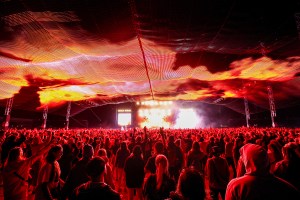Reading & Leeds Boss Melvin Benn on the ‘Groundbreaking’ Future of the Festival, Booking Chappell Roan & (Hopefully) Oasis
Each summer, the youth contingent flocking to Reading Festival and its northern counterpart, Leeds, remains overwhelming. The dual sites welcome a combined 170,000 ticket-holders each year, the majority of whom are teenage fans experiencing their first-ever festival. The weekender event has long known and upheld its role, overlapping with GCSE results week – the equivalent of a U.S. high school diploma – and therefore functioning either as a celebration or a distraction from disappointment.
It is here where, even through the scrim of a collective hangover, thousands of new friendships begin and formative music memories are made. As head of Festival Republic, veteran promoter and U.K. Power Players honoree Melvin Benn has seen this milestone experience play out before him countless times. He has led operations at Reading since 1989, while also building an events portfolio that encompasses Suffolk’s Latitude Festival and Electric Picnic in Stradbally, Ireland, as well as the rap and R&B-focused Wireless in London, which hosted a three-night Drake takeover this year.
Benn, who began his career producing political festivals in the late 1970s, believes that Reading & Leeds is unique in that it has long offered a communal experience of independence and release for young people. Its audience size and ticket sales have helped to solidify its dominant place in the U.K. festival space, but Benn says its strength goes beyond economics and comes from a culture of adaptability among his team, alongside seizing new opportunities.
The Leeds site was introduced in 1999, and over the past few decades, it has played host to monumental sets from the likes of Oasis (2000), Kendrick Lamar (2015, 2018), and Metallica (2015), among others. Recent years have also seen the likes of Bring Me The Horizon (2022, 2025) and Lana Del Rey (2024) rise through the ranks to headliner status, broadening the festival’s crossover appeal.
For 2025, Reading & Leeds is launching the biggest camping overhaul in the twin festival’s history, introducing five new campsites including dedicated gender-inclusive spaces and a wellness field with yoga and upcycling workshops. Over 50% of this year’s ticket-holders have booked on to one of these areas prior to arrival on-site, Benn tells Billboard U.K., hailing the initiative as “groundbreaking”.
The line-up, meanwhile, is led by Travis Scott, Bring Me The Horizon and a co-headline booking of Hozier and Chappell Roan. It was seeing the latter’s stratospheric rise over the past year, plus her “phenomenal” ticket sales in the US – she will play four nights at New York’s Forest Hills stadium this fall – that gave Benn the confidence to give her the top billing, a move that “has absolutely hit a sweet spot” with Reading & Leeds’ primarily Gen Z audience, he says.
“I think it’s a pointer to all festivals to not be afraid and to be bold with their bookings,” Benn continues. “To say that you were there when Chappell criticised Donald Trump from the Reading Festival stage, for example, or when Hozier stood up and said, ‘Free Palestine’… only a certain number of people can be there at that moment and actually experience it.”
Billboard U.K. caught up with Benn to discuss the continued evolution of Reading & Leeds, alongside his plans to push the envelope forward when it comes to sustainability standards at all of his large-scale, commercial festivals.
How has fan feedback and operational lessons shaped the campsite layout this year?
In simple terms, camping at festivals hasn’t really changed since I first started going to them in the 1970s. The toilets are definitely better, but generally, the experience is not that different. The post-COVID generation generally wants more space, so I wanted to loosely break down the people that come to Reading & Leeds.
There’s a younger female group and an LGBTQ+ community that don’t necessarily want to be next to people going wild on the campsite at four o’clock in the morning. There’s an eco team, which is really strong. There’s the older [age] group, which wants to be able to go back and not have half a dozen lads and lasses in the tent next to them staying awake all night. And then, there’s a surprising amount of people that come on their own; if you’re in a campsite of solo attendees, I think communication is much easier. It gives people the ability to meet others and say, ‘I’m going to see Bring Me the Horizon. Do you want to come with me?’
This is about wanting people to feel secure and cozy in where they choose to camp – and it’s working. I think this will be something that other festivals will develop and mirror in the future.
How do you stay in tune with what Gen Z wants out of a festival experience?
These days, festival-goers completely embrace social media. Last year I brought in The Aux Stage, and that was to engage with influencers and podcasters and give them a platform. The ability to put these people into a festival environment where they can learn about their audiences and connect with them emotionally is really important.
It’s extraordinary that, if you think about it, musicians and bands have become successful by writing songs about their points of view. And now, social media influencers are becoming famous by expressing their points of view, but not necessarily to music. So it’s not that much different in a way. They’re young people that are speaking their mind and I think it’s fantastic.

Festival goers watch Skrillex perform live on the Chevron stage during day three of Reading Festival 2024 at Richfield Avenue on August 25, 2024 in Reading, England.
Simone Joyner/Getty Images
What’s something older generations perhaps misunderstand about the way younger people experience festivals today?
Some people think festivals should be the same as they were for them [in the past]. That, for me, is the single most important issue. I think what we’re finding now is that the generations are changing quicker than they used to; each one appears to be getting shorter and shorter before another iteration comes through. We want to evolve alongside their changing tastes and trends – as a festival, why wouldn’t we want to follow what our audience is interested in?
The artwork for Liam Gallagher’s C’mon You Know LP speaks to that sentiment: it was shot at his Reading 2021 headline set, and shows dozens of young fans jumping around him in the crowd. Would you like to see Oasis return at some point?
I mean, every promoter in the world wants to see Oasis playing on their stage! I don’t see it happening in the short term. But would it happen in the long term? Of course, I live in hope in that sense. It’s not on the agenda for the band in the short term; I do know that for certain.
But, you know, it’s that thing of how festivals provide an opportunity to engage with people that are not necessarily your core audience, you perform to fans that wouldn’t have come to your concert previously. They might have an opinion about you, they might not like you even though they’ve never seen you, et cetera – and then suddenly you’re performing in front of them, and you convert them. I think that is one of the greatest assets that festivals bring to the artists: to draw in an audience that otherwise wouldn’t see you.
Yungblud has also been spoken about as a potential headliner for years, but we’ve seen him start his own festival [Bludfest]. What do you think of acts taking the onus on and building their own events?
The fact that Yungblud has his own festival is great and I’m very supportive of that. The more festivals, the better. Other people have their own festivals, too: Drake has OVO [in Toronto], and he played three nights at Wireless a few weekends ago, which was extraordinary. I think Drake’s performance at Wireless demonstrates that you can have your own festival and you can also really, really excel at someone else’s festival. So I don’t think it’s an either or. I think people can still do both.
How does Reading & Leeds fit into the global festival landscape? Do you keep an eye on what’s happening at places like Coachella or Primavera?
Yeah, of course – this is my world. I can’t pretend I don’t keep an eye on other festivals! Reading & Leeds, Primavera, and Coachella all have a lot of crossover when it comes to artists, but culturally, they could not be further apart. We’re on different planets, in that sense.
I mean, the idea of only being able to have a pint of beer in a location where you can’t watch a band – as is the case at Coachella – wouldn’t make sense to our audience. Could you say that to the average Yorkshire lad, or some lass that’s come over from Cardiff to Reading? No! Primavera, meanwhile, is not a camping festival. Still, we’re looking at each other all of the time. Reading & Leeds, Coachella, Primavera, Rock Werchter, Lollapalooza: they’re the biggest festivals in the world, in my view. Glastonbury is an entirely different beast.

Sam Fender performs on Day 2 of Leeds Festival 2023 at Bramham Park on Aug. 26, 2023 in Leeds, England.
Matthew Baker/Getty Images
What role do you think festivals like Reading & Leeds should play in setting environmental standards for the wider live entertainment sector?
I’ve been measuring my carbon footprint at the festival since 2006, well before anybody else. And I’ve had a full-time sustainability manager at Festival Republic since 2008. I think we have to be seen to be doing the right thing; we have to be seen to be leading the way. We have to recognize the importance that [our festivals] have in people’s lives.
We have a great sustainability policy, and part of that is actually talking to people about it, and I’m very proud of that. I also do want people to enjoy themselves at a festival and not to be worrying about doing the right thing all the time. So I actually think that it’s our responsibility [as festival owners] to be doing the right thing, rather than forcing it on [the audience] and criticising anybody that’s doing the wrong thing.
I think it’s sad that the government doesn’t do more. Unfortunately, it’s slow the way they’re moving away from petrol and diesel engines to green energy; it’s slow in terms of the number of places you can charge your electric car. The government are holding us back more than anybody now, as far as I’m concerned. I think most festivals have shown the way forward and I’m pleased to say that we have played our part in that.
In an industry changing as fast as it is, what do you hope never changes about Reading & Leeds?
The vibrancy of the festival and its feeling of optimism. A very large number of people that attend Reading & Leeds are our future doctors and pilots, our future police officers and judges, lawyers and solicitors et cetera… they arrive at the festival with massive optimism about their future. I love seeing that it’s a place where young people begin to learn about themselves and express themselves. I hope that never changes.








